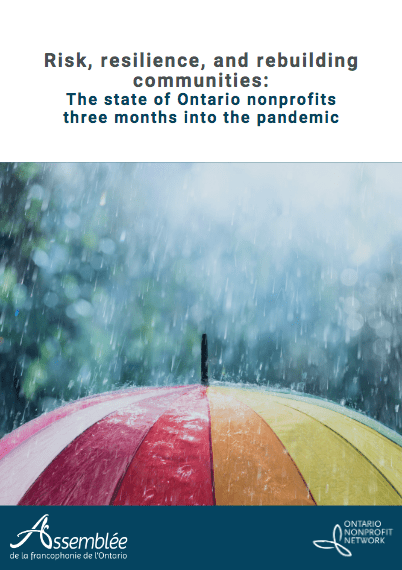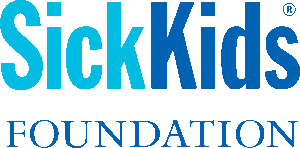COVID-19 Surveys 2020
The state of the Ontario nonprofit sector three months into the COVID-19 crisis
ONN and the Assemblée de la Francophonie de l’Ontario (AFO) partnered on a bilingual survey to understand of the impact of the pandemic on Ontario’s 58,000 nonprofits and charities, and the effectiveness of the public policy and supports provided by the provincial and federal governments. It was also conducted to gather evidence of the need for future support or policy decisions on the road to recovery to emphasize, respect and recognize the role of nonprofits in their communities.
1,131 nonprofits and charitable organizations in Ontario participated in the survey in June 2020. Findings show that in the face of COVID-19 nonprofits continue to adapt to uncertain economic and political times. This survey follows the ONN’s COVID-19 Flash Survey and AFO’s Analyse du sondage sur la relance économique franco-ontarienne which provided a foundational perspective of the impact of COVID-19 on nonprofits at the start of the pandemic, as well as considerations around what would be needed for the recovery. This survey provides a crucial follow up, painting a picture of how the sector fared three months into the pandemic.
Three months into the COVID-19 crisis, Ontario’s nonprofits and charities face new challenges and more uncertainty. The impacts on the sector, its workers, volunteers and the communities they serve are becoming more pronounced as the health crisis recedes (for now) and the economic crisis deepens. This strain is in addition to COVID-related mental health needs, increased intimate partner violence, and the growing realization that marginalized communities- notably low-income households and racialized communities- have suffered disproportionate effects.
Summary of key findings:
- Government supports – federal and provincial – have failed to recognize the size, scope, and economic impact of the nonprofit sector and have therefore fallen far short of what is needed to help nonprofits through the crisis and into recovery
- Over the last three months nonprofits have resorted to a combination of using their reserves, with 35 per cent of nonprofits indicating that they have had to access their reserves, while just under a quarter (22 per cent) of respondents have resorted to pay cuts, with 10 per cent of respondents using personal funds to meet the financial need of their organizations
- Piecemeal solutions, although helpful in the short-term, are not working for nonprofits organizations and communities they support
- Nonprofits across the province have continued to adapt, working more closely with grassroots organizations and local networks to support those in their communities
- More collaboration, flexibility and partnership between nonprofits and governments will be required, especially as all sectors plan for the recovery
Highlights
Concern for financial sustainability and operational health:
- 40 percent of nonprofits continue to experience an increase in demand for services
- Estimated financial losses of about $90 million for respondents ($121,229 per nonprofit)
- Over 3 in 10 nonprofits have had to lay off staff, estimated at 3,000 job losses among respondents, for an average of 2.65 jobs per organization
- 1 in 5 respondents say they could close within the next 6 months
Lack of access to government supports:
- Only 35 per cent of responding organizations benefited from the federal wage subsidy, while over a quarter (28 per cent) of nonprofits were ineligible
- Three-quarters (75 per cent) of nonprofits did not benefit from any provincial funding measures announced to support the nonprofit sector during the COVID crisis
- Two-thirds (67 per cent) of nonprofits did not benefit from any of the tax measures announced in the Ontario government’s COVID-19 Action Plan
- Francophone organizations were significantly more likely to receive federal funding than anglophone organizations, compared to anglophone organizations who were slightly more likely to get provincial funding than Francophone organizations
Collaborating, adapting, and demonstrating resilience:
- Over 200 respondents have collaborated locally with new mutual aid and/or grassroot groups to respond to the needs of their communities on the ground
- Highest instances of collaboration with mutual aid and grassroots groups are reported by Grant making, Fundraising, and Voluntarism promotion, Law, Advocacy, and Politics, and Social Services subsectors
Recommendations
ONN and AFO continue to be concerned with how nonprofits and charities will survive not just in the next few months, but into 2021. With the possibility of a second wave of infections, it is more prudent than ever for governments to demonstrate their commitment to the nonprofit sector by working in partnership to address challenges. We urge governments at all levels, as well as other funders and donors, to act now to ensure that nonprofits and charities can continue to meet their missions and serve their communities in these extremely challenging times.
- The Ontario government must create a nonprofit sector stabilization fund to backstop massive revenue losses, prevent permanent job losses and closures, support the sector to “re-tool” to post-pandemic conditions, prepare for a second wave, and ramp up quickly in response to renewed demand for services
- The Ontario government should accelerate the deployment of pandemic pay, and other supports, which took too long to reach front-line organizations
- The Government of Canada should ensure the federal emergency wage subsidy program is more flexible and responsive to nonprofit business models
- Both levels of government must invest in rural broadband to help both nonprofits and small businesses thrive in small communities across Ontario
- Both levels of government must create a nonprofit sector advisory table to inform planning for the economic recovery, with representation from all nonprofit sectors
ONN and AFO will continue to advocate for:
Immediate financial support to nonprofits
Action on the provincial nonprofit sector stabilization fund to address the urgent needs of the nonprofit sector as an employer of one million Ontarians across a vast range of industries: social services, health, arts and culture, sport and recreation, environment, faith groups, social enterprises, and more. This fund would support a wide range of organizations across the province by helping them to continue to keep the doors open and respond to rising community needs and costs
Employer and Worker Supports:
- Ensure CEWS program design meets nonprofit needs: The CEWS and its extension to November 19, 2020 has been a welcomed support for the sector. While the new program guidelines are encouraging, the underlying assumption of the subsidy is still that employers will recoup revenues./ This assumption does not address nonprofit models and business revenues where nonprofits may not be able to re-engage in earned income activities due to the time of year and social distancing rules even if the economy re-opens.
- Invest in and increase access to high-speed internet: Eenable nonprofits, particularly those in the north and rural parts of the province, to move to virtual work. The issue of unequal access to high-speed has and continues to emerge as an impediment for nonprofits ability to provide support, keep their staff employed and serve their communities
- Accelerate the deployment of wage subsidies, such as pandemic pay, and other supports to ensure that nonprofits are able to support their workers and can easily access funds and resources available to them. This should be done with the intention to reduce the administrative burden associated with these supports
Reopening and Recovery
A seat for nonprofits at planning tables focused on economic recovery at the federal and provincial levels.
Take action:
- Share the report with your networks
- Share your experiences with government. Share your organization’s story with your MPP of how COVID-19 has impacted on your organization and your communities. Which supports could help? This is a strategic time to reach out, as MPP are in their home ridings this summer ready to meet constituents
- Advocate for a sector-wide stabilization fund. As the data has shown, current government funding and supports are not reaching all organizations, and recent funding announcements funds are not for new money and will not fill these gaps
- Spread the word. Email your local community newspaper, call your local talk radio show, and push out your points on social media (being sure to tag your local MPP)
- Dig into the data. We’ve shared the data sets on our report webpage for you to use for your own data crunching and advocacy work
Explore our survey data sets (.xlsx format):
Media requests:
Please contact Sarah Matsushita, Director of Communications and Engagement at sarah@theonn.ca or 647-648-7657.



